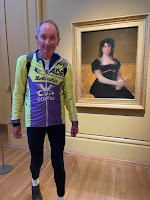It's always inspiring to read so many pages in the weekend newspapers with recommendations from authors journalists and critics listing their favourite books as the year ends.
So, let me suggest a few titles that might appeal, potential Christmas presents. It's two and a half years since I last compiled such a list (1). Most of my selections are of books published in 2023, the best of those that I have read this year.
Before this, however, I must pay tribute to all of the authors whose creativity transports readers so vividly, setting us as witnesses into places actions and time-zones, both real and imagined. At the same time, I'm reminded of what may or may not be some people's image of writers.
This time last year "Act of Oblivion" written by Robert Harris was selected by the Times as its historic fiction book ot 2022. As soon as the paperback edition was published this year, I snapped up a copy and - was not disappointed. Set in Cromwellian England, this 550-page epic novel tells the spell-binding story of the murder of King Charles I and the ruthless pursuit of fugitives by the secretary of the regicide committee. Set in the context of his work across different and more recent eras in our history, Harris's genius for narrative warrants public attention and respect. As such, this is a candidate for my novel of the year.
Another classic - in my opinion - albeit hailing from the previous year is "Klara and the Sun" by Kazuo Ishiguro, who won the Nobel Prize for literature in 2017. As a sign of the author's prescience, his superb novel's theme has become an even bigger theme in many ways this year - Artificial Intelligence. Set in the near future, relevant to our era, this novel is both topical and worrying in equal measure.
On the international front, Scandinavian noir continues to grab the imagination if only because there is a continuing supply of excellent authors and of icey locations catering for that bleak atmospherics fix. This year I found "You Can't See Me" by Eva Bjorg Aegisdottir. It's part of the author's "Forbidden Iceland" series. A family reunion in remote Iceland turns out to be at least as scary as you might desire and expect.
Towards the end of the year, I examined the bookshelves at home for another read, being too lazy to brave the winter storms to buy something new. To my delight, and with thanks to my late wife's book-buying habit, I have discovered an author familiar to many but new to me. One novel is entitled "Leaving Home" published in 2005, the other "Undue Influence" is from 1999. Their author (now deceased) is the art historian Anita Brookner whose style and pacing is such a contrast to Noir, to crime or to political fast-paced and page-turning thrillers. She tells stories using proper prose and syntax about seemingly uncomplicated everyday lives and featuring few characters. Both novels centre on a thoughtful female lead who is preoccupied with internally analysing life and relationships. She communicates in a calming manner.
Examples of the opposite style - rapid, action-packed crime thrillers - came my way this year from two well-known American authors. David Baldacci's published his latest "Long Shadows" about FBI agent Amos Decker and the murder of a federal judge. It is complete with all sorts of twists and turns which kept me going with 575 pages to be turned; as did his 600-page crime thriller "The 6:20 Man." I learned much about the rasping greed of some New York traders. His novels may be long but time flies as each involved plot evolves relentlessly.
The other author that fits broadly into this category is John Grisham. Two new books by him grabbed my attention. "Sparring partners" marks a change of style consisting of three stand-alone shortish stories. Their themes concentrating on legal dramas will reassure Grisham fans. His other book this year was "The Boys from Biloxi." This involved a more apparent style change in which Grisham has written an almost Baldacci-esque blockbuster. A first novel from his pen running to over 500 pages, this one is a legal drama set in a coastal location with dire complications unfolding for owners of gambling casinos and strip joints.
Another author deserving of a mention has two unrelated and thematically contrasting novels on my list. One is "The Undertaking" and the other is "The Colony." Both are the work of Audrey Magee. The former is a love story against the backdrop of the German invasion of Russia in World War 2; while the latter, which was long-listed for the 2022 Booker Prize, is a movingly haunting tale about survival and romance on an idyllic island off the west coast of Ireland as threats to the Irish language lurk.
My choice for the non-fiction book of the year is Manchán Magan's "Listen to the land Speak." Magan is an acknowledged expert on Irish folklore and linguistics. The originality of this book is its stunning ability to bring pre-historical verbal accounts from Irish mythology to intersect with archaeology. Using clues from a range of sources such as place names geography and local legends he manages to place certain myths to ancient sites that local people have always known about. This book is a follow-up to his earlier work about Irish linguistics "Thirty-two Words for Field."
By coincidence the next book I read bore on a similar theme - as if I had been subconsciously directed to read one after the other. The ironically entitled novel "Haven" written by Emma Donoghue, the Irish-Canadian screenwriter whose earlier "Room" was a Booker Prize finalist and adapted as a movie winning an Oscar. "Haven" is a story of early Irish Christian monks in 600AD Ireland establishing a monastic base on a rugged and bare island. A fictional account of events follows, which may or may not bear a resemblance to the actual occupation of Skellig Michael, a UNESCO World Heritage Site (2). This international asset was infamously used a few years ago as a location on two episodes of the fantasy Star Wars (3). "Haven" is another candidate for my top novel of 2023.I conclude with a discovery of another new author. Earlier in the year this book caught my eye, being special for two reasons. The first was that it was stamped on publication by the Times reviewer as its novel of the month; the second was the surname of the author. "Squeaky Clean" is the debut novel by Callum McSorley. It's reminiscent in some ways of the Booker prize-winning "Shuggie Bain" insofar as it is a gritty story set in Glasgow and at times a difficult story to observe. Callum's book is an assured debut recounting life and survival in the midst of organised crime and violence. Powerful stuff and scarily realistic.
©Michael McSorley 2023
References
1. https://michaelmcsorleyculture.blogspot.com/2021/06/summer-books.html
2. https://heritageireland.ie/places-to-visit/skellig-michael/
3. https://www.skelligmichael.com/star-wars/












